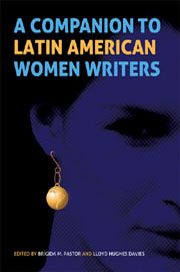Book contents
- Frontmatter
- Contents
- Introduction: The Feminine Voice in Latin American Literature
- 1 Sor Juana Inés de la Cruz (1648/51?–1695)
- 2 Gertrudis Gómez de Avellaneda (1814–1873)
- 3 Gabriela Mistral (1889–1957)
- 4 Alfonsina Storni (1892–1938)
- 5 Silvina Ocampo (1903–1993)
- 6 Clarice Lispector (1920–1977)
- 7 Rosario Castellanos (1925–1974)
- 8 Elena Poniatowska (1933– )
- 9 Alejandra Pizarnik (1936–1972)
- 10 Luisa Valenzuela (1938– )
- 11 Isabel Allende (1942– )
- 12 Rosario Ferré (1938– )
- 13 Laura Esquivel (1950– )
- 14 Laura Restrepo (1950– )
- Conclusion
- Bibliography
- Index
11 - Isabel Allende (1942– )
Published online by Cambridge University Press: 05 February 2013
- Frontmatter
- Contents
- Introduction: The Feminine Voice in Latin American Literature
- 1 Sor Juana Inés de la Cruz (1648/51?–1695)
- 2 Gertrudis Gómez de Avellaneda (1814–1873)
- 3 Gabriela Mistral (1889–1957)
- 4 Alfonsina Storni (1892–1938)
- 5 Silvina Ocampo (1903–1993)
- 6 Clarice Lispector (1920–1977)
- 7 Rosario Castellanos (1925–1974)
- 8 Elena Poniatowska (1933– )
- 9 Alejandra Pizarnik (1936–1972)
- 10 Luisa Valenzuela (1938– )
- 11 Isabel Allende (1942– )
- 12 Rosario Ferré (1938– )
- 13 Laura Esquivel (1950– )
- 14 Laura Restrepo (1950– )
- Conclusion
- Bibliography
- Index
Summary
Isabel Allende (1942–) is, of course, a flesh-and-blood writer, but she is also very much a phenomenon. There are two moments and two books which mark her launch and re-launch as a literary sensation. The first is 1982 and the publication of her first novel La casa de los espíritus [The House of the Spirits]. The novel was an instant and huge success. Though initially circulated clandestinely in Allende's native Chile (then under military rule), it became a massive international bestseller, was translated into around thirty languages and later made into a film with a star-studded cast (1994). Allende came to be seen as the first major woman writer from Latin America to hit the international big time and to challenge the perceived male dominance of Latin American letters in the wake of the so-called Boom of the New Novel. Moreover, her challenge was also seen to be against the supposed elitism of male Boom narrative: her success in academic circles was matched, and indeed overtaken, by her popularity in the mass market amongst ordinary readers. In a sense, she was able to claim a kind of widespread impact that no other Latin American author had ever really achieved. However, though she remained very successful, her follow-up novels did not have quite the impact of La casa de los espíritus. Moreover, her daughter Paula contracted porphyria in Madrid in 1991 and went into a lengthy coma until her tragic death the following year.
- Type
- Chapter
- Information
- A Companion to Latin American Women Writers , pp. 159 - 168Publisher: Boydell & BrewerPrint publication year: 2012



